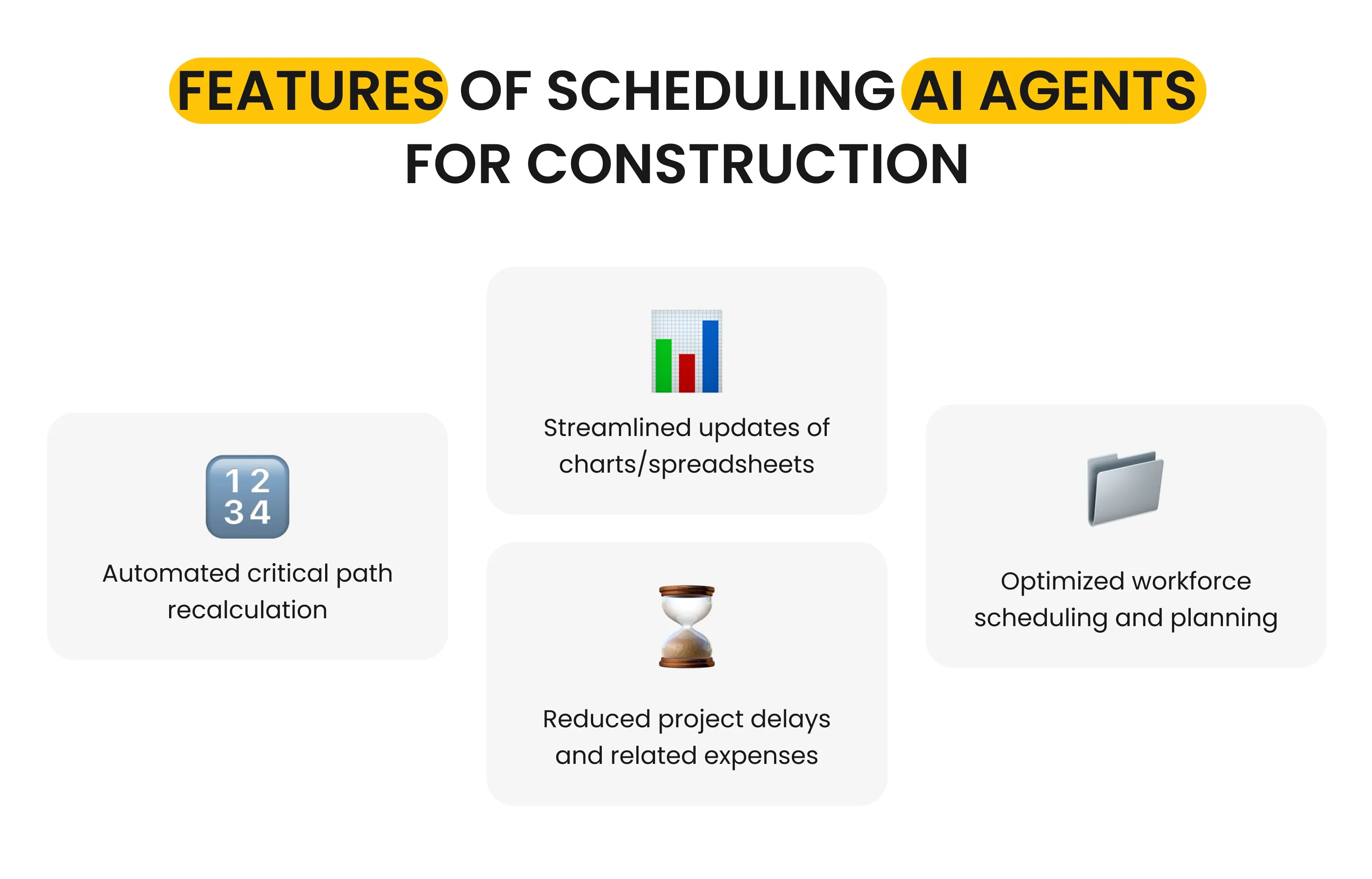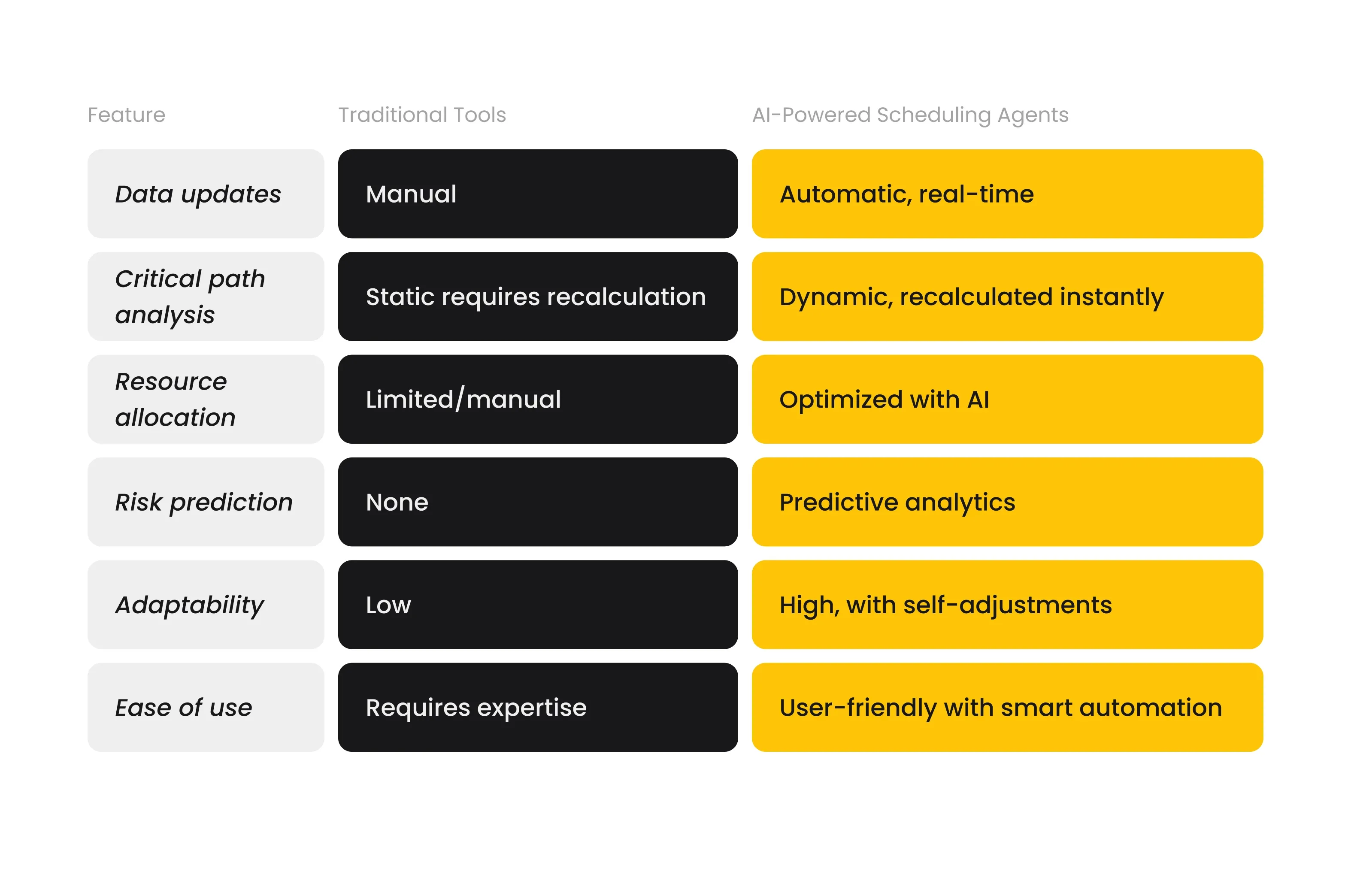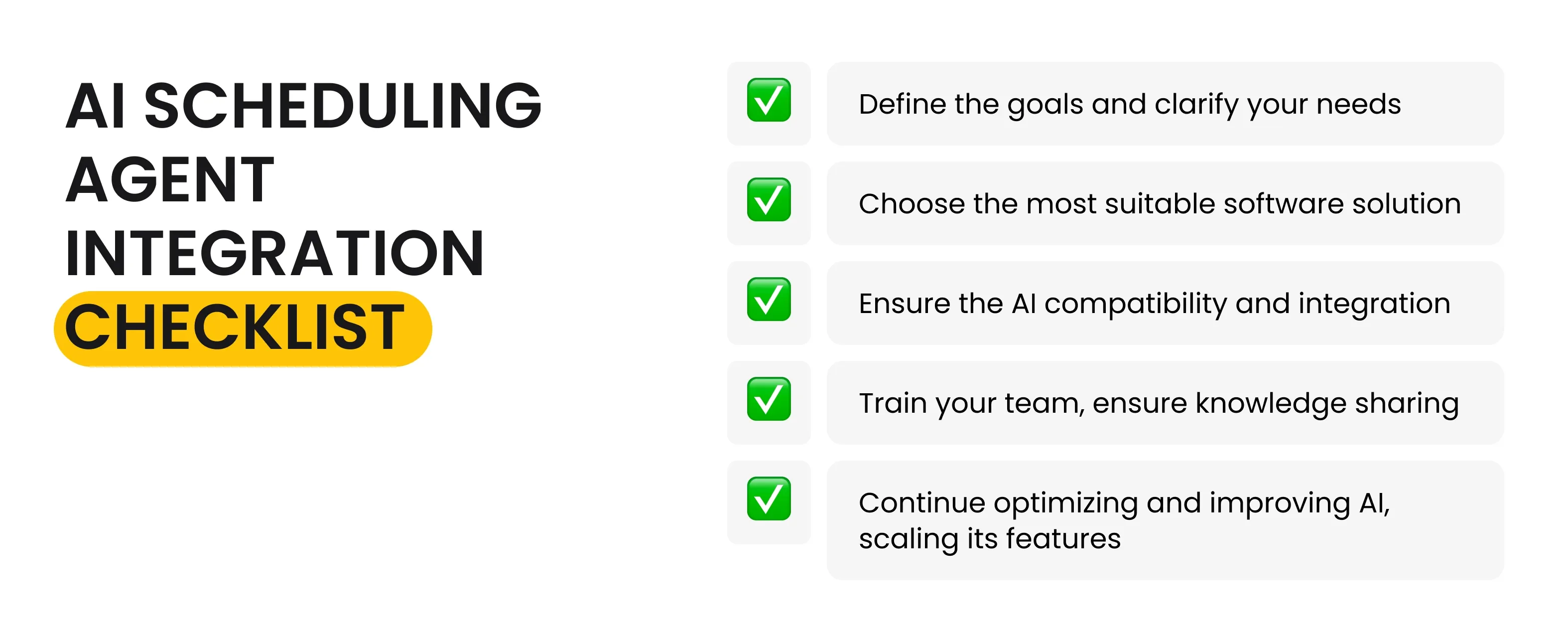Construction
How AI-Powered Scheduling Agents Improve Project Management in Construction?
September 02, 2025 • 209 Views • 18 min read
Bohdan Vasylkiv
CEO & Co-Founder
Construction projects frequently experience delays, cost overruns, and inadequate resource allocation. An AI scheduling agent solves these problems by automating planning tasks, recalculating project paths, and optimizing workforce management.
Unlike traditional manual tools for scheduling, such AI-powered systems reduce human errors, save time, and keep projects on track with real-time adaptability, thanks to advanced algorithms under the hood.
The challenge for project managers is orchestrating complex schedules and plans across multiple teams or tasks. At the same time, an AI scheduling agent can act as a reliable assistant.
It can help with handling repetitive tasks, updating timelines, and predicting risks, so your employees can focus on strategy, quality, and delivery instead of dealing with numerous repetitive and manual processes.
What Are Scheduling Agents in Construction?
A scheduling agent in construction is an advanced system with built-in artificial intelligence. It has the capacity to automate planning, scheduling, and monitoring project activities.

One of the core pain points in construction project management is the high dependence on static spreadsheets or manual updates. Fortunately, even the simplest AI-based agents allow specialists to automate these spreadsheets, making them dynamic and updated in real-time, which also enhances data management operations.
However, such services require custom AI automation services from experienced teams, familiar with these technologies and your industry. Moreover, it is worth considering the overall experience of spreadsheet automation, as AI-related software services can vary significantly depending on your needs and project context.
The key features of an AI agent for scheduling should include task automation, predictive analytics, and seamless integration with project management systems. They help project managers make decisions more quickly and accurately by analyzing constraints, resources, and timelines.
This agent functions as a digital project assistant, tracking selected processes and informing specialists, or streamlining certain operations. It can also constantly monitor activities, recalculate priorities, and suggest improvements whenever changes occur in the project environment.
How Scheduling Agents Improve Project Management?
AI scheduling agents address the most common challenges: frequent delays, poor resource allocation, and time-consuming manual updates. By automating complex tasks, they improve accuracy, enhance productivity, and reduce project risks.
Being more industry-specific, we can name the following benefits of such integration for construction firms:
- Automated Gantt chart updates
- Critical path recalculation
- Workforce scheduling optimization
- Reducing project delays & costs
Automated Gantt Chart Updates
Streamlined spreadsheets are one potential way to utilize AI automation capabilities. Still, modern AI models can be easily trained to work not only with tables and columns, but also with more specific management solutions, such as Gantt charts.
Today, IT solutions for construction enable the integration of AI agents that automatically update schedules, eliminating the need for a dedicated specialist to manually edit Gantt charts. As a result, any change in tasks, deadlines, or dependencies will be instantly reflected across the entire chart, ensuring accuracy and saving hours of repetitive work.
Critical Path Recalculation
The critical path is essential for construction success because it directly determines project completion. An AI scheduling assistant can quickly recalculate it whenever conditions change, providing managers with a real-time view of project bottlenecks and helping them act before delays escalate.
As a result, such integration helps prevent potential expenses and wasted time by consistently offering the latest and most relevant data, allowing managers to make adjustments as needed.
Workforce Scheduling Optimization
Intelligent scheduling software can also be beneficial for planning and management. For instance, such implementations can be partly used as construction workflow management software.
For example, AI-driven workforce planning solutions can analyze employees’ availability, skill sets, and workload capacity to allocate resources efficiently. As a result, it prevents overstaffing, underutilization, and scheduling conflicts, ensuring the right people are in the right place at the right time.
Reducing Project Delays & Costs
Finally, a project scheduling assistant obviously helps prevent or, at least, reduce project delays. Such systems offer numerous ways and services to achieve higher cost-efficiency and ensure the accuracy of project planning or estimation.
For instance, artificial intelligence helps minimize unexpected disruptions by constantly monitoring schedules and predicting risks. Early detection of conflicts or inefficiencies reduces costly rework and prevents overruns, keeping projects within budget and on schedule.
For an even better illustration of how an AI-powered project management scheduling agent benefits the business, let’s compare it with more traditional tools.
AI Scheduling vs. Traditional Scheduling Tools
Traditional construction planning and scheduling tools like Microsoft Project, Primavera P6, or Excel had a vital influence on the modern industry, providing companies with more advanced solutions for project management and tracking.

When they were implemented, such software tools marked the beginning of a new era in technology, offering significantly more benefits, control, and usability. For example, it was possible to share the same spreadsheet with multiple people at once, significantly improving awareness of any updates and changes within the document.
Still, despite their overall usability and advanced features, these solutions are not perfect compared to paper-based documentation. While widely used, they are prone to errors and still require significant manual input. In addition to this, with multiple spreadsheets or other online documents that are regularly updated, a new challenge emerged: managing version control.
Long story short, even though modern construction managers can access files online, they commonly implement changes manually and locally. So, it is essential to ensure real-time communication between departments that rely on the same spreadsheet. Otherwise, different specialists can spend hours updating the same document without considering other recently updated data.
On the other hand, AI-powered scheduling agents offer real-time automation, predictive adjustments, and intelligent recommendations. Additionally, most such solutions are cloud-based, meaning that all updates occur in the same file, thereby eliminating version control issues.
Additionally, AI construction scheduling reduces the workload on dedicated specialists by providing them with multiple automation services and features, significantly decreasing the likelihood of mistakes, while also accelerating data update times to almost instant.
Simply put, AI project scheduling positively impacts the foregoing aspects of construction management and planning:
- Data updates (Automated and real-time)
- Critical path analysis (Dynamic with instant recalculation)
- Resource allocation (Optimized with AI and access to other platforms)
- Risk prediction and prevention (excellent built-in predictive analytics)
- Ease of use (User-friendly with smart automation options)
How to Implement Scheduling Agents in Project Management Systems?
Successful implementation of scheduling agents requires careful planning and structured execution. Here are the key steps:
- Assess Current Scheduling Practices
- Select the Right AI Tool
- Integrate with Project Management Systems
- Train Teams and Managers
- Monitor and Optimize
Let’s consider the core factors to consider during each stage.

Step 1: Assess Current Scheduling Practices
Just like any other software development or integration project, you must start by assessing your current practices and tools, as well as considering the goals you want to achieve by implementing new software solutions.
While evaluating your current construction management state, focus on identifying existing gaps, bottlenecks, and challenges in your scheduling process. Knowing the imperfections of your current construction scheduling software, you can make a more informed decision on the best technologies or practices to address real problems rather than adding unnecessary complexity.
Besides, at this stage, you may already find that with a proper approach and tech partnership, you can address the most crucial issues without the need to integrate complex or expensive software. Based on our experience, approximately 2 out of 10 such construction projects require optimization and simpler automation.
It doesn’t mean that you won’t benefit from integrating artificial intelligence in these cases. However, it can be a crucial factor in instances where your business has limited resources but requires urgent improvements to balance ROI, boost performance, accuracy, and cost-efficiency.
Step 2: Select the Right AI Tool
After identifying your pain points, defining your budget, and pinpointing your primary goals, you can start browsing through available AI tools and choosing the right construction management software that meets your needs and limitations.
When choosing an AI agent for scheduling, it is essential to ensure its compatibility with other software systems or other technologies you are using for business. Without seamless integration, efficiency will decrease significantly, or even render AI tools unsuitable for specific tasks.
Your scheduling agent must be compatible with your existing project management software. It is the most essential factor. Additionally, look for features like Gantt chart automation, workforce optimization, and predictive analytics. However, they are not as vital: any experienced software development team can enable such services if needed.
Step 3: Integrate with Project Management Systems
In addition to integrating AI into the core project management platform, you should also perform other similar operations. For instance, integrated BoQ software enables employees to leverage AI-powered solutions and further enhance their usability fully.
Seamless integration ensures the automation of data flows between the AI agent and your existing tools, eliminating the need for duplicate entry, reducing errors, minimizing human intervention, and streamlining data management practices.
To summarize, without proper data flow and integration with other systems, you won’t be able to fully utilize the potential of AI-powered solutions. In addition to its limited functionality, this will negatively impact the accuracy and efficiency of suggestions made by artificial intelligence.
Step 4: Train Teams and Managers
Any new software scaling or integration requires training. Otherwise, your team won’t be able to use all the features and services of the implementation. Unfortunately, it is one of the most underestimated steps in each AI product.
Thus, provide comprehensive training for teams, so they understand how to use the system effectively. One of the easiest and most efficient ways to do so - is to ask your tech partner, responsible for integration.
Such specialists have the best understanding of the integrated model, its capacities, strengths, and weaknesses. Using this awareness and familiarity with the technology, these developers can create comprehensive documentation and training guides for your in-house team, ensuring they understand WHY, WHEN, and HOW to use AI-powered scheduling or management assistants.
Our case studies demonstrate that higher adoption rates occur when managers witness how AI reduces their workload and improves accuracy. So, avoid repeating the mistakes of your rivals and pay attention to training materials and custom guidelines.
Remember: using AI is not only about proper prompting, but also understanding the capabilities of your model, as well as the best cases for its application.
Step 5: Monitor and Optimize
Finally, don’t forget to keep tracking your integration. Implementing such complex and innovative software is a challenging decision. It is possible to say that AI integration is just the start of a long journey.
For example, you will still have to train the chosen model, feed it with data, and monitor its responses. Some open-source AI models regularly suffer from hallucinations, when AI generate random responses that have nothing in common with reality. The best, if not only, way to prevent it is to constantly monitor its performance, provide new information, and optimize the system as needed.
Thus, don’t forget to continuously track results, gather feedback, and fine-tune the scheduling agent. The more data it processes, the more accurate and valuable it becomes.
AI-Powered Scheduling Agent Integration with Incora
Summarizing the above, AI-powered scheduling agents are revolutionizing the management of construction projects. Just as Microsoft Project, Primavera P6, and Excel changed the management sphere years ago, modern AI solutions offer innovative and efficient ways to automate updates, recalculate critical paths, optimize workforce allocation, and minimize delays.
Compared to traditional tools, they offer speed, intelligence, accuracy, and adaptability, which are highly demanded by the modern construction industry.
Now is the time to rethink project scheduling. By integrating an AI scheduling agent, construction companies can improve efficiency, cut costs, and deliver projects on time.
Ready to future-proof your construction projects? Contact us to explore AI scheduling solutions today and see the difference in your next project. Fill the
What’s your impression after reading this?
Love it!
25
Valuable
19
Exciting
11
Unsatisfied
1
FAQ
Let us address your doubts and clarify key points from the article for better understanding.
What is an AI-powered scheduling agent?
An AI-powered scheduling agent is an intelligent software that automates appointment and meeting scheduling by interacting with users naturally, managing calendars, finding optimal times, sending reminders, and adapting to preferences and real-time changes. It improves efficiency, reduces errors, and enhances convenience across industries like healthcare and services.
How do scheduling agents improve project timelines?
Scheduling agents improve project timelines by automating task allocation, optimizing resource use, and predicting potential delays. They dynamically adjust schedules in real-time, identify risks early, and provide data-driven insights, enabling proactive decision-making. This leads to increased efficiency, fewer bottlenecks, and projects completed on time with better quality.
Can scheduling agents help with workforce allocation?
Yes, scheduling agents significantly help with workforce allocation by automating shift assignments based on employee skills, availability, and preferences while optimizing staffing levels for business needs. They improve schedule flexibility, reduce conflicts, ensure fair distribution of work, predict staffing demands, and enhance overall workforce productivity and satisfaction.
Are scheduling agents compatible with existing project management tools?
Yes, scheduling agents are compatible with existing project management tools. Many AI scheduling tools integrate seamlessly with popular platforms like Asana, Wrike, Monday.com, and Smartsheet, enhancing workflows by automating task prioritization, resource allocation, and timeline optimization without disrupting established processes. This interoperability improves efficiency and project outcomes.
YOU MAY ALSO LIKE
Management Systems
Construction Project Management Software for Small Business: Complete Guide
Construction,
Real Estate
How Construction Workflow Management Software Helps to Reduce Costs and Boost Efficiency?
Construction
How Integrated BOQ Software Bridges the Gap Between Construction Departments
Construction
How to Create a Procore Alternative Software for a Construction Business
Construction
How to Deal With Weaknesses of Construction Financial Management Software?
Real Estate
How to Select the Right Construction Management Software for Your Business
Construction
Investing in the Right Construction Reporting Software: Features That Make a Difference
Construction
Is Voice Technology Worth the Investment for Construction Firms?
Construction
Overcoming Integration Challenges: Making Construction Data Work Together with BI Tools
Management Systems
Simple Construction Software for Construction Planning: Case Study
Let’s talk!
This site uses cookies to improve your user experience. Read our Privacy Policy
Accept
Share this article